Implanted coils can cure a few types of lung diseases, reveals new study

Many people suffering from lung diseases can now breathe easy. A new French study has found a minimally invasive way to cure some of these diseases.
The new technique involves insertion of small coils, made of metal alloy, into the lungs of the patients with the help of a scope. These needles work by tightening the affected tissue and opening up healthy airways, reports Fox News.
Using the coil treatment, patients showed reduced symptoms of coughing and breathlessness. They were also able to walk further.
The study findings, published in the Journal of the American Medical Association, involved 100 patients, across 10 hospitals in France. The patients were randomly assigned either for usual care or coil treatment.
The technique can help avoid surgery in patients suffering from emphysema, which is commonly seen in chronic obstructive pulmonary disease (COPD). London-based BTG PLC, which is the manufacturer of the coil, had earlier announced similar preliminary findings in a US study.
However, Dr. Ravi Kalhan, a Northwestern University lung specialist who was involved in the US study, warns that while the coil treatment could provide real benefits for a select group, it will not work for many COPD patients. But, he adds, ”every little increment of something that could work in COPD is significant.”
COPD is found to affect 65 million people globally, of which 15 million have been reported in the US. It is a major cause of death and disability as patients show difficulty in climbing stairs, even showering and dressing, without getting out of breath.
Researchers say that further studies are needed to determine outcomes in the long term. Dr. Frank Sciurba, a University of Pittsburgh lung disease specialist, wrote in a JAMA editorial that while coil treatment is costlier than usual therapy, long-term quality of life improvements would help balance the monetary costs.





















